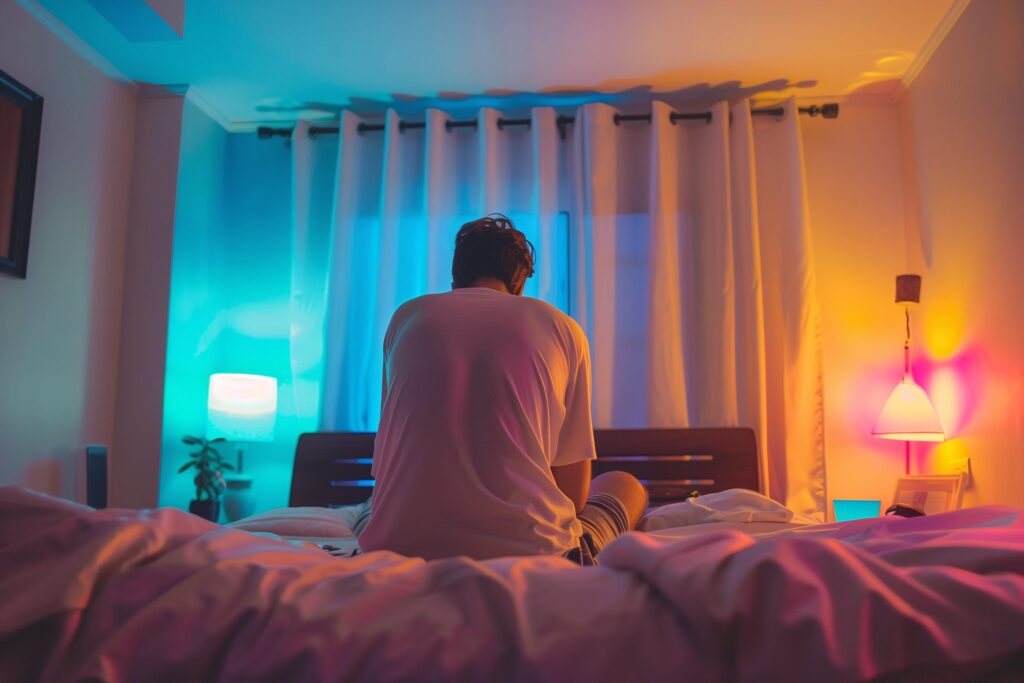
The Efficacy of Hypnosis in Treating Insomnia
Have you heard about hypnotherapy for insomnia? Explore the efficacy of hypnosis in treating insomnia and why it might help you get better sleep.

If you struggle with insomnia, you might be on the lookout for some alternative, non-pharmaceutical treatments for your sleep disorder. One of the common but under-discussed treatment options is actually hypnosis. This practice involves putting the patient in a state of consciousness that focuses their attention but reduces their peripheral awareness, making them more likely to respond to suggestions prompted by the hypnotist. While it might sound ineffective, you’ll be surprised by some of the insights that we have found.
In this article, we’ll explore why people use hypnosis to treat insomnia, how it works, as well as the benefits and challenges of this practice. We’ll provide you with a clear look at whether or not this might be for you and how effective this truly is for those with insomnia. Let’s get into first why people have turned to hypnosis and what value they find in this method.
Why People Use Hypnosis to Treat Insomnia
To many reading this, hypnosis might seem like an odd choice for insomnia. People have seen TV shows that hypnotize people, but can it truly help with sleep challenges? According to many experts, hypnosis is a method often considered by people with insomnia and potentially other sleep disorders because of how relaxed the person feels while hypnotized. Because of the emphasis on relaxation, hypnosis might be easier to use for insomnia (Source: Complementary Therapies in Medicine).
Not only that, but as the same study shares, this has been used for other issues, like anxiety, depression, and even pain. If hypnosis can work for many of these related concerns, why should it not also work for insomnia? As shown in many studies, hypnosis may work for insomnia, but it is not a straightforward solution as of yet due to a lack of research.
Does Hypnosis Work for Insomnia?
While many people first turn to cognitive behavioral therapy (CBT) or other pharmacological interventions, hypnosis might be able to help with insomnia. Some studies have considered it “generally beneficial” because it helps enhance relaxation and reduce overactive cognition.
However, others have gone as far as to conclude that, at least for school-aged kids with insomnia, hypnosis helped get children to sleep even faster in up to 90% of the participants in the study. Additionally, of these participants, 52% stated that they were no longer waking up at night, and another 38% said that their sleep improved. In other words, children are definitely helped by insomnia, but experts and medical professionals have still not confirmed that this is a widespread, beneficial treatment option for insomnia.
The truth is that hypnosis works for some but does not work for others. There are many reasons to believe it might work for you, but there are also some challenges that have to be addressed. Let’s explore both the advantages and the disadvantages of using hypnosis for insomnia.
Advantages of Hypnosis for Insomnia
There are many reasons to believe that hypnosis for insomnia can be beneficial, and much of this belief is rooted in the therapy’s non-pharmaceutical nature. Many physicians report that hypnosis is a favorable option because it is noninvasive, holistic, and can also provide long-term benefits. Here’s an overview of the advantages of hypnosis for insomnia:
- Noninvasive, Holistic Therapy: Many prefer hypnotherapy because it does not involve medication. It’s simply a relaxation technique that can be administered in minutes but provides lasting effects.
- Long-Term Benefits: As mentioned, studies have stated that many medical professionals like hypnotherapy because it provides long-term symptom relief, which is a major bonus for those who struggle with insomnia and its effects.
- Patient-Centered Treatment: Hypnosis is one of the best treatments for insomnia because it can be tailored to your specific concerns. For example, if your insomnia may be caused by fears, you can have tailored hypnosis sessions to resolve these traumas.
- Proven Effects on Individuals: Many experts have proven that for many individuals, including shift workers, hypnosis works to help with insomnia and sleep improvements. One study showed that shit workers experienced better sleep quality, quicker time to sleep, and less fatigue as a result.
With all of these benefits, you might be jumping to try this for your insomnia. However, we haven’t looked at some of the challenges, of which there are several. Let’s explore the reasons why people are not all supportive of supposed insomnia’s efficacy for insomnia treatment.
Challenges of Hypnosis for Insomnia
Despite the fact that many experts and medical professionals see the value in insomnia, it’s not a fool-proof treatment option for insomnia. Here are some of the challenges and reasons why people believe hypnosis not to be effective for insomnia:
- Not Helpful for All Patients: While many people find help in regular hypnotherapy, it doesn’t work for all individuals. In a literature survey, only 58.3% of all studies showed benefits resulting from hypnotherapy, while 12.5% showed mixed results and 29.2% showed no reported benefit (Source: PubMed).
- Potential for Adverse Effects: After you get your hypnosis done, you might not immediately experience benefits. Some people might feel its power long after the session, experiencing hallucinations, delusions, and even functional pain without any sort of stimulus to cause it (Source: Medical News Today).
- Conflicting Results: The research we have presented here shows that people are conflicted about the true nature of hypnosis. Some say that hypnosis can help with sleep problems, while others rebuke that claim and say it doesn’t. Unfortunately, mixed results mean mixed outcomes for many patients.
As you can see, hypnosis might seem like a good idea, but there’s no conclusive agreement in the scientific community that it is of benefit. However, that doesn’t mean you shouldn’t give it a try if you feel it might be the right fit for your situation.
Is Hypnosis the Right Treatment for You?
If you are concerned about your insomnia, hypnosis might be a good option that can help you alleviate your symptoms and avoid medications. However, it’s essential to keep in mind that the method might not be as proven as other treatment options. As long as you work with a qualified professional and seek help from the right people, it is worth a try.
To learn more about sleep health and how you can sleep better at night, visit our website today for more articles on the latest and most significant insights from the field.
FAQ
What’s the difference between hypnosis and meditation?
Both hypnosis and meditation involve deep relaxation, but they serve different purposes. Hypnosis is goal-oriented and often guided by a therapist, using suggestions to shift thoughts or behaviors. Meditation focuses on mindfulness and presence without trying to change anything—just observing and calming the mind.
What should I expect during a hypnotherapy session for insomnia?
In a typical session, you’ll sit or lie down comfortably while a therapist guides you into a relaxed state using calming imagery and verbal cues. Once you're deeply relaxed, they offer positive suggestions to reduce anxiety and promote healthier sleep habits.
Can hypnosis be combined with other treatments for insomnia?
Yes, hypnosis can work well alongside treatments like CBT-I (cognitive behavioral therapy for insomnia), mindfulness, or sleep hygiene routines. It’s often used as part of a broader strategy to help calm a racing mind or reduce sleep-related anxiety.
Is hypnosis suitable for children with insomnia?
It can be, especially for children dealing with anxiety-related sleep issues. That said, it’s important to consult a pediatric sleep specialist or a certified hypnotherapist trained to work with children to ensure it’s appropriate and safe for their age and needs.
Can I use hypnosis apps or recordings to fall asleep?
Yes, many people use hypnosis apps or guided recordings as part of their nightly routine. While not a substitute for working with a trained hypnotherapist, these tools can still be effective in helping you relax, let go of racing thoughts, and ease into sleep naturally.

Written by
Marie Soukup
Marie Soukup is a seasoned copywriter, editor, and Integrative Nutrition Health Coach with a certificate from the Institute of Integrative Nutrition (IIN). With years of experience working with brands across diverse industries, Marie is passionate about holistic health and crafting compelling content.
Download Pillow
Get help
Press & News
Legal
Connect
X (Twitter)
Company
Copyright © Neybox Digital Ltd.



